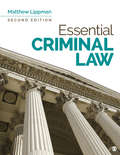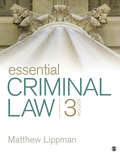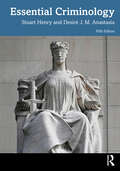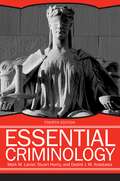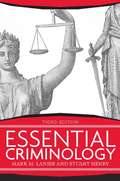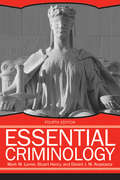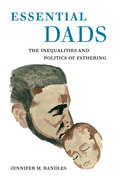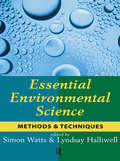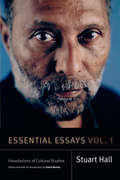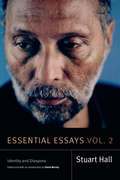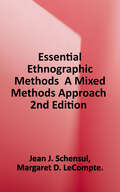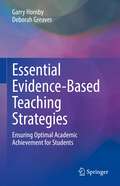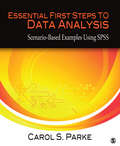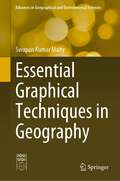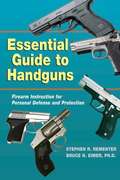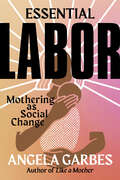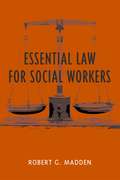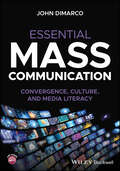- Table View
- List View
Essential Criminal Law
by Matthew LippmanEssential Criminal Law, Second Edition equips students with a foundational and practical understanding of criminal law in the United States, as well as encourages strong legal reasoning skills for students with no prior exposure to case law. Award-winning professor and bestselling author Matthew Lippman guides students through the complexities of the legal system using thought-provoking examples of real-life crimes and legal defenses, along with highly approachable case analyses. Updated with the most current developments in criminal law and public policy, the Second Edition takes students beyond the classroom and prepares them to apply criminal law in today’s legal world.
Essential Criminal Law
by Matthew LippmanEssential Criminal Law provides a highly accessible introduction to U.S. criminal law that helps students, including those with no prior exposure to case law, build their legal reasoning skills. Drawing from more than 30 years of teaching experience, best-selling author Matthew Lippman guides readers through the complexities of the legal system using thought-provoking examples of real-life crimes and legal defenses, along with approachable case analyses. The Third Edition keep readers up to date with coverage of timely topics and the most current developments in criminal law and public policy.
Essential Criminal Law
by Matthew LippmanEssential Criminal Law provides a highly accessible introduction to U.S. criminal law that helps students, including those with no prior exposure to case law, build their legal reasoning skills. Drawing from more than 30 years of teaching experience, best-selling author Matthew Lippman guides readers through the complexities of the legal system using thought-provoking examples of real-life crimes and legal defenses, along with approachable case analyses. The Third Edition keep readers up to date with coverage of timely topics and the most current developments in criminal law and public policy.
Essential Criminology
by Stuart Henry Desiré J. AnastasiaThis significantly expanded edition of Essential Criminology covers the broadest range of criminological theories—the essential criminological theories—from longstanding ones such as classical theory and strain theory to recently introduced ones such as ultra-realism and green cultural criminology. Whether all are “essential” depends on one’s theoretical stance. The value of this text is its carefully designed comparative analysis, which helps readers consider their relative contribution to the field. Originally designed as an alternative to lengthy and expensive introductory texts, Essential Criminology provides a concise, yet comprehensive overview of the field. The book offers a clear, structured, student-friendly, critical analytical examination of the nature of crime, theories of crime causation, and their criminal justice policy implications. Causal theories covered range from micro-level classical and rational choice to biological psychological, social learning, social control, and interactionist perspectives, to macro-level social ecology, anomie/strain, conflict, Marxist, feminist, and postmodernist theories. Over its 26-year history the book has added new theoretical perspectives as these have gained prominence. New to this edition are chapters on critical and ultra-realism, and critical green criminology and discussions of zemiology, critical race theory, and quantum holographic criminology. The authors have also expanded some theoretical frameworks that had previously been underdeveloped such as opportunity theory, subcultural theory, and social constructionism.Essential Criminology contextualizes criminology in the globally interdependent 21st century, addressing the crimes of terrorism, global pandemics, and climate change. With its cutting-edge updates, illustrative real-world examples, and student-friendly study tools, including analytically comparable summary charts exposing each theory's ontological assumptions, this text was designed primarily for undergraduate criminology courses, but has also been adopted by community colleges and graduate programs in criminology, sociology, and political science.
Essential Criminology
by Mark M. Lanier Stuart Henry Desiré J. M. AnastasiaIn the fourth edition of Essential Criminology, authors Mark M. Lanier, Stuart Henry, and Desiré J. M. Anastasia build upon this best-selling critical review of criminology, which has become essential reading for students of criminology in the 21st century. Designed as an alternative to overly comprehensive, lengthy, and expensive introductory texts, Essential Criminology is, as its title implies, a concise overview of the field. The book guides students through the various definitions of crime and the different ways crime is measured. It then covers the major theories of crime, from individual-level, classical, and rational choice to biological, psychological, social learning, social control, and interactionist perspectives. In this latest edition, the authors explore the kind of criminology that is needed for the globally interdependent twenty-first century. With cutting-edge updates, illustrative real-world examples, and new study tools for students, this text is a necessity for both undergraduate and graduate courses in criminology.
Essential Criminology
by Mark M. Lanier Stuart Henry Desiré J. M. AnastasiaIn the fourth edition of Essential Criminology, authors Mark M. Lanier, Stuart Henry, and Desiré J. M. Anastasia build upon this best-selling critical review of criminology, which has become essential reading for students of criminology in the 21st century. Designed as an alternative to overly comprehensive, lengthy, and expensive introductory texts, Essential Criminology is, as its title implies, a concise overview of the field. The book guides students through the various definitions of crime and the different ways crime is measured. It then covers the major theories of crime, from individual-level, classical, and rational choice to biological, psychological, social learning, social control, and interactionist perspectives. In this latest edition, the authors explore the kind of criminology that is needed for the globally interdependent twenty-first century. With cutting-edge updates, illustrative real-world examples, and new study tools for students, this text is a necessity for both undergraduate and graduate courses in criminology.
Essential Criminology
by Mark M. Lanier Stuart HenryIn the third edition of Essential Criminology, authors Mark M. Lanier and Stuart Henry build upon their critical review of criminology, expanding their coverage of the multifaceted “Crime Prism,” adding boxed readings by both international theorists and students, and identifying the six fundamental world changes that are altering the way we think about crime. By reframing crime and its control in the context of global interdependence, the communications revolution, and changing perceptions of national security, the authors ask: what kind of criminology is needed for the twenty-first century? With cutting-edge updates and illustrative real-world examples of everything from Blackwater to government surveillance and Lombroso’s legacy to the global spread of disease, this text is a necessity for both undergraduate and graduate courses in criminology.
Essential Criminology
by Mark M. Lanier Stuart HenryIn the third edition of Essential Criminology, authors Mark M. Lanier and Stuart Henry build upon their critical review of criminology, expanding their coverage of the multifaceted "Crime Prism," adding boxed readings by both international theorists and students, and identifying the six fundamental world changes that are altering the way we think about crime. By reframing crime and its control in the context of global interdependence, the communications revolution, and changing perceptions of national security, the authors ask: what kind of criminology is needed for the twenty-first century? With cutting-edge updates and illustrative real-world examples of everything from Blackwater to government surveillance and Lombroso's legacy to the global spread of disease, this text is a necessity for both undergraduate and graduate courses in criminology.
Essential Criminology
by Mark M. Lanier Stuart HenryThis bestselling core text for crime and criminology courses has been fully revised and updated to address cutting-edge theory and fundamental world changes that are altering the way we think about crime.
Essential Criminology: A Research Guide For Criminology And Criminal Justice
by Mark M. LanierIn the fourth edition of Essential Criminology, authors Mark M. Lanier, Stuart Henry, and Desire .M. Anastasia build upon this best-selling critical review of criminology, which has become essential reading for students of criminology in the 21st century. Designed as an alternative to overly comprehensive, lengthy, and expensive introductory texts, Essential Criminology is, as its title implies, a concise overview of the field. The book guides students through the various definitions of crime and the different ways crime is measured. It then covers the major theories of crime, from individual-level, classical, and rational choice to biological, psychological, social learning, social control, and interactionist perspectives. In this latest edition, the authors explore the kind of criminology that is needed for the globally interdependent twenty-first century. With cutting-edge updates, illustrative real-world examples, and new study tools for students, this text is a necessity for both undergraduate and graduate courses in criminology.
Essential Dads: The Inequalities and Politics of Fathering
by Dr. Jennifer M. RandlesIn Essential Dads, sociologist Jennifer Randles shares the stories of more than 60 marginalized men as they sought to become more engaged parents through a government-supported "responsible" fatherhood program. Dads’ experiences serve as a unique window into long-standing controversies about the importance of fathering, its connection to inequality, and the state’s role in shaping men’s parenting. With a compassionate and hopeful voice, Randles proposes a more equitable political agenda for fatherhood, one that carefully considers the social and economic factors shaping men’s abilities to be involved in their children’s lives and the ideologies that rationalize the necessity of that involvement.
Essential Demographic Methods
by Kenneth W. WachterEssential Demographic Methods brings to readers the full range of ideas and skills of demographic analysis that lie at the core of social sciences and public health. Classroom tested over many years, filled with fresh data and examples, this approachable text is tailored to the needs of beginners, advanced students, and researchers alike. An award-winning teacher and eminent demographer, Kenneth Wachter uses themes from the individual lifecourse, history, and global change to convey the meaning of concepts such as exponential growth, cohorts and periods, lifetables, population projection, proportional hazards, parity, marity, migration flows, and stable populations. The presentation is carefully paced and accessible to readers with knowledge of high-school algebra. Each chapter contains original problem sets and worked examples. From the most basic concepts and measures to developments in spatial demography and hazard modeling at the research frontier, Essential Demographic Methods brings out the wider appeal of demography in its connections across the sciences and humanities. It is a lively, compact guide for understanding quantitative population analysis in the social and biological world.
Essential Environmental Science: Methods and Techniques
by Simon Watts Lyndsay HalliwellEssential Environmental Science brings together within a single volume the vast range of techniques, methods and basic tools necessary for the study of the environment. Environmental science has a massive area of operation, utilising the tools from a plethora of traditional sciences and social sciences. This practical manual draws on contributions from leading experts in each field, to present both general and specific environmental methods and techniques within a unique interdisciplinary environmental perspective.Essential Environmental Science offers an invaluable reference source for environmental study in both the laboratory and in the field.
Essential Essays, Volume 1: Foundations of Cultural Studies (Stuart Hall: Selected Writings)
by Stuart Hall David MorleyFrom his arrival in Britain in the 1950s and involvement in the New Left, to founding the field of cultural studies and examining race and identity in the 1990s and early 2000s, Stuart Hall has been central to shaping many of the cultural and political debates of our time. Essential Essays—a landmark two-volume set—brings together Stuart Hall's most influential and foundational works. Spanning the whole of his career, these volumes reflect the breadth and depth of his intellectual and political projects while demonstrating their continued vitality and importance.Volume 1: Foundations of Cultural Studies focuses on the first half of Hall's career, when he wrestled with questions of culture, class, representation, and politics. This volume's stand-out essays include his field-defining “Cultural Studies and Its Theoretical Legacies"; the prescient “The Great Moving Right Show,” which first identified the emergent mode of authoritarian populism in British politics; and “Encoding and Decoding in the Television Discourse,” one of his most influential pieces of media criticism. As a whole, Volume 1 provides a panoramic view of Hall's fundamental contributions to cultural studies.
Essential Essays, Volume 2: Identity and Diaspora (Stuart Hall: Selected Writings)
by Stuart Hall David MorleyFrom his arrival in Britain in the 1950s and involvement in the New Left, to founding the field of cultural studies and examining race and identity in the 1990s and early 2000s, Stuart Hall has been central to shaping many of the cultural and political debates of our time. Essential Essays—a landmark two-volume set—brings together Stuart Hall's most influential and foundational works. Spanning the whole of his career, these volumes reflect the breadth and depth of his intellectual and political projects while demonstrating their continued vitality and importance.Volume 2: Identity and Diaspora draws from Hall's later essays, in which he investigated questions of colonialism, empire, and race. It opens with “Gramsci's Relevance for the Study of Race and Ethnicity,” which frames the volume and finds Hall rethinking received notions of racial essentialism. In addition to essays on multiculturalism and globalization, black popular culture, and Western modernity's racial underpinnings, Volume 2 contains three interviews with Hall, in which he reflects on his life to theorize his identity as a colonial and diasporic subject.
Essential Ethnographic Methods: A Mixed Methods Approach (Ethnographer's Toolkit, Second Edition Ser. #3)
by Margaret D. LeCompte Jean J. SchensulThis is Book 3 of 7 in the Ethnographer's Toolkit, Second Edition. Essential Ethnographic Methods introduces the fundamental, face-to-face data collection tools that ethnographers and other qualitative researchers use on a regular basis. It provides ethnographers with tools to answer the principal ethnographic questions about setting, participants, activities, behavior, and more. The essential "mixed" methods for collecting data include open-ended and focused listening, questioning strategies, participant and non-participant observation, recording techniques, visual recall, mapping the environments and contexts in which participant behavior occurs, and engaging in ethnographically informed survey research. Because these data collection strategies require ethnographers to become involved in the local cultural setting and to acquire their experience through hands-on experience, the essential tools also allow them to learn about new situations from the perspective of an "insider." With these detailed instructions, the quality and scope of the data ethnographers collect are sure to be improved.
Essential Evidence-Based Teaching Strategies: Ensuring Optimal Academic Achievement for Students
by Garry Hornby Deborah GreavesThis book examines evidence-based practices that facilitate effective teaching to ensure optimum educational achievement for school-age students. It identifies key strategies with extensive research evidence that confirms their effectiveness in improving student outcomes. The book offers guidelines for teachers to use in distinguishing between strategies that are evidence-based and those with little or no supporting evidence. It describes common instructional strategies often found in schools despite having little evidence to support their effectiveness. In addition, the book identifies eight key evidence-based teaching practices that can be directly implemented by classroom teachers, reviews the theoretical and research base of each of these strategies, and provides guidelines for special and general education teachers on how to apply them most effectively, with links to video examples of their use in classrooms. The text also examines common barriers to the use of evidence-based practices in schools. It explores implications for teacher education, focusing on training educators to identify and implement evidence-based strategies effectively, avoiding those lacking evidence, even if they are popular in schools. Essential Evidence-Based Teaching Strategies is a must-have resource for researchers, professionals, and graduate students in educational psychology, child and school psychology, and social work who are interested in learning about and implementing effective teaching methods that improve student engagement and academic achievement, strengthen social-emotional learning, and reduce school dropout rates.
Essential First Steps to Data Analysis: Scenario-Based Examples Using SPSS
by Carol S. ParkeCarol S. Parke′s Essential First Steps to Data Analysis: Scenario-Based Examples Using SPSS provides instruction and guidance on preparing quantitative data sets prior to answering a study′s research questions. Such preparation may involve data management and manipulation tasks, data organization, structural changes to the data files, or conducting preliminary analysis. Twelve research-based scenarios are used to present the content. Each scenario tells the "story" of a researcher who thoroughly examined their data and the decisions they made along the way. The scenario begins with a description of the researcher′s study and his/her data file(s), then describes the issues the researcher must address, explains why they are important, shows how SPSS was used to address the issues and prepare data, and shares the researcher′s reflections and any additional decision-making. Finally, each scenario ends with the researcher′s written summary of the procedures and outcomes from the initial data preparation or analysis.
Essential Graphical Techniques in Geography (Advances in Geographical and Environmental Sciences)
by Swapan Kumar MaityRepresentation of geographical data using graphs, diagrams and mapping techniques is a key for geographers and for researchers in other disciplines to explore the nature of data, the pattern of spatial and temporal variations and their relationships, and formulation of principles to accurately understand and analyze features on or near the earth’s surface. These modes of representation also enable the development of spatial understanding and the capacity for technical and logical decision making. The book depicts all types of graphs, diagrams and maps, explained in detail with numerous examples. The emphasis is on their appropriate data structure, the relevance of selecting the correct technique, methods of their construction, advantages and disadvantages of their use, and applications of these techniques in analyzing and realizing the spatial pattern of various geographical features and phenomena. This book is unique in that it reflects a perfect correlation between theoretical knowledge of geographical events and phenomena and their realistic implications, with relevant examples using appropriate graphical methods. The book serves as a valuable resource for students, researchers, cartographers and decision makers to analyze and represent various geographical data for a better, systematic and scientific understanding of the real world.
Essential Guide to Handguns: Firearm Instruction for Personal Defense and Protection
by Stephen R. Rementer Bruce N. EimerExplanation of who should and shouldn't consider handguns or other firearms for personal protection, family defense, legal, physical and ethical ramifications of ownership and use. How to select equipment with explanation of guns, methods of carrying, safety and ease-of-use. Explanations of legalities of ownership and usage. Those who find this book interesting may also want to read "Armed Response: A Comprehensive Guide to Using Firearms for Self-Defense," which is also available from Bookshare.
Essential Labor: Mothering as Social Change
by Angela GarbesFrom the acclaimed author of Like a Mother comes a reflection on the state of caregiving in America, and an exploration of mothering as a means of social change.The Covid-19 pandemic shed fresh light on a long-overlooked truth: mothering is among the only essential work humans do. In response to the increasing weight placed on mothers and caregivers—and the lack of a social safety net to support them—writer Angela Garbes found herself pondering a vital question: How, under our current circumstances that leave us lonely, exhausted, and financially strained, might we demand more from American family life? In Essential Labor, Garbes explores assumptions about care, work, and deservedness, offering a deeply personal and rigorously reported look at what mothering is, and can be. A first-generation Filipino-American, Garbes shares the perspective of her family's complicated relationship to care work, placing mothering in a global context—the invisible economic engine that has been historically demanded of women of color. Garbes contends that while the labor of raising children is devalued in America, the act of mothering offers the radical potential to create a more equitable society. In Essential Labor, Garbes reframes the physically and mentally draining work of meeting a child's bodily and emotional needs as opportunities to find meaning, to nurture a deeper sense of self, pleasure, and belonging. This is highly skilled labor, work that impacts society at its most foundational level.Part galvanizing manifesto, part poignant narrative, Essential Labor is a beautifully rendered reflection on care that reminds us of the irrefutable power and beauty of mothering.
Essential Law for Social Workers
by Robert G. MaddenThis book explores legal concepts, legal reasoning, and legal processes--illustrated with case vignettes from social work practice--in order to provide social work practitioners and students with practical and accessible legal knowledge. It introduces readers to scholarship about the law and to conceptual knowledge that can be applied to any interaction with the legal system. The volume features a discussion of recent reform movements, including Alternative Dispute Resolution, and an appendix of sources for legal information and research on the law.
Essential Law for Social Workers (Foundations of Social Work Knowledge Series)
by Robert MaddenWhether protecting their own rights or those of their clients, or navigating the juvenile justice, immigration, or welfare systems, social workers confront legal issues every day. This book explores legal concepts, legal reasoning, and legal processes—illustrated with case vignettes from social work practice—in order to provide social work practitioners and students with practical and accessible legal knowledge. It introduces readers to scholarship about the law and to conceptual knowledge that can be applied to any interaction with the legal system. Social workers are thereby enabled to "think like a lawyer" and increase their effectiveness. The volume features a discussion of recent reform movements, including Alternative Dispute Resolution, and an appendix of sources for legal information and research on the law.
Essential Mass Communication: Convergence, Culture, and Media Literacy
by John DiMarcoHelps students develop the ability to analyze culture and utilize media literacy techniques, provides the core skills necessary to succeed in a communications career Essential Mass Communication helps students build a strong understanding of communication theory, mass communication technology, information studies, and mass communication practices. Offering an expanded view of the field, this comprehensive textbook combines easily accessible coverage of core skills and concepts with historically critical content on mass communication revolutions, cultural impacts, and converging media as they changed society. Throughout the text, author John DiMarco integrates professional practice components into each chapter, including professional pathways to applying mass communication to students' careers. Essential Mass Communication addresses a variety of creative fields, such as storytelling, rhetoric, journalism, marketing and advertising, design, fine art, photography, and filmmaking. Student-friendly chapters explore a uniquely wide range of topics, from introductory content on communication process and product to more in-depth discussion of game history and theory, critical theory, strategic communication, and more. Designed to help aspiring creative professionals learn and use the technology tools and channels available to deliver cultural and personal experiences in the form of media products, Essential Mass Communication: Introduces the concepts of mass communication and establishes foundations for understanding convergence and culture Provides the skills and knowledge required to apply critical media literacy analysis techniques in different fields Discusses the driving technologies, key people, convergence, and cultural instances of each mass communication media Covers the business and information disciplines of mass communication, including ethics and communication law Highlights the connection between communication technologies, culture, and careers in mass media Includes a wealth of real-world case studies, applied examples and assignments, key term definitions, end-of-chapter questions, in-text QR codes linking to internet sources, and valuable appendices for career development With a strong focus on creative, active learning, Essential Mass Communication: Convergence, Culture, and Media Literacy is the perfect textbook for undergraduate and graduate courses in Mass Communication, Information Studies, and Communication technologies, as well as relevant courses in Media Studies, International Communications, and Marketing, Advertising, and Public Relations programs.
Essential Mathematics for Political and Social Research
by Jeff GillEssential Mathematics for Political and Social Research addresses an educational deficiency in the social and behavioral sciences. This 2006 book was the first of its kind to specifically address the comprehensive introduction to the mathematical principles needed by modern social scientists. The material introduces basic mathematical principles necessary to do analytical work in the social sciences, starting from first principles, but without unnecessary complexity. The core purpose is to present fundamental notions in standard notation and standard language with a clear, unified framework throughout. Through examples and exercises, this book is intended to not only motivate specific mathematical principles and practices, but also introduce the way that social science researchers use these tools. The intended emphasis is on conceptual understanding of key principles and their subsequent application.
